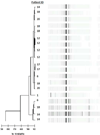Treatment and clinical outcomes of urinary tract infections caused by KPC-producing Enterobacteriaceae in a retrospective cohort
- PMID: 22691610
- PMCID: PMC4289904
- DOI: 10.1016/j.clinthera.2012.05.002
Treatment and clinical outcomes of urinary tract infections caused by KPC-producing Enterobacteriaceae in a retrospective cohort
Erratum in
- Clin Ther. 2012 Aug;34(8):1844
Abstract
Background: Optimal treatment regimens for infections caused by Klebsiella pneumoniae carbapenemase (KPC)-producing Enterobacteriaceae are not well-defined.
Objectives: This study describes the treatment and outcomes in patients with urinary tract infection (UTI) caused by KPC-producing Enterobacteriaceae.
Methods: This retrospective cohort study analyzed data from adult inpatients with bacteriuria caused by KPC-positive organisms treated at Barnes-Jewish Hospital from June 1, 2006, to February 1, 2008. KPC-positive isolates were identified utilizing disk-diffusion susceptibility testing and confirmed to contain bla(KPC) via molecular methods.
Results: Twenty-one patients met the inclusion criteria and all were classified as having symptomatic UTI. The majority of patients were female (15/21 [71%]), and the mean (SD) age was 62.4 (15.2) years. Successful clinical and microbiologic responses were observed in 16 patients (76%) for both outcomes. Patients with urinary catheters had them removed or replaced in 9 of 15 cases (60%). Antibiotics active against the isolated pathogen were provided in 14 of 21 cases (67%), often after considerable delay (median, 72.5 hours [range, 4-312 hours]). All 7 patients receiving aminoglycoside therapy had successful clinical and microbiologic responses, and in vitro testing of an extended antibiotic panel revealed high susceptibility rates for tigecycline (28/29 [97%]), minocycline (22/29 [76%]), and fosfomycin (25/29 [86%]) against the KPC-positive isolates.
Conclusions: Although receipt of appropriate therapy was delayed in many cases, clinical outcomes investigated revealed [corrected] high rates of successful response in this defined group of patients Aminoglycosides and tetracycline derivatives suggested therapeutic promise in the treatment of KPC-producing Enterobacteriaceae UTI.
Copyright © 2012 Elsevier HS Journals, Inc. All rights reserved.
Conflict of interest statement
The authors indicate that they have no conflicts of interest regarding the content of this article.
Figures
References
-
- Boucher HW, Talbot GH, Bradley JS, et al. Bad bugs, no drugs: no ESKAPE! An update from the Infectious Diseases Society of America. Clin Infect Dis. 2009;48:1–12. - PubMed
-
- Nordmann P, Cuzon G, Naas T. The real threat of Klebsiella pneumoniae carbapenemase-producing bacteria. Lancet Infect Dis. 2009;9:228–236. - PubMed
-
- Deshpande LM, Rhomberg PR, Sader HS, Jones RN. Emergence of serine carbapenemases (KPC and SME) among clinical strains of Enterobacteriaceae isolated in the United States Medical Centers: report from the MYSTIC Program (1999–2005) Diagn Microbiol Infect Dis. 2006;56:367–372. - PubMed
MeSH terms
Substances
Grants and funding
LinkOut - more resources
Full Text Sources
Medical
Miscellaneous


